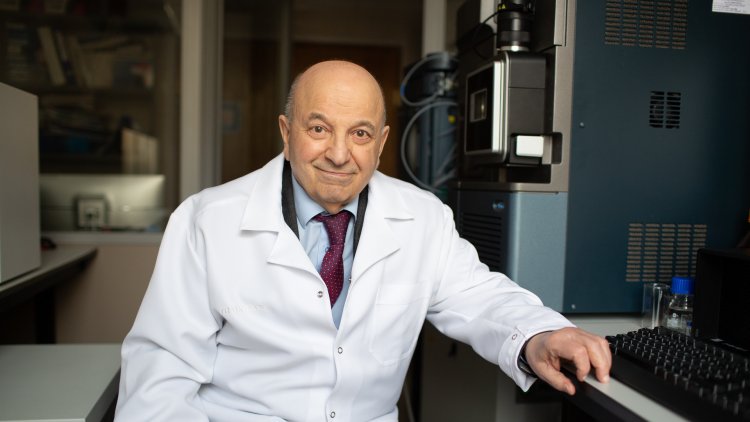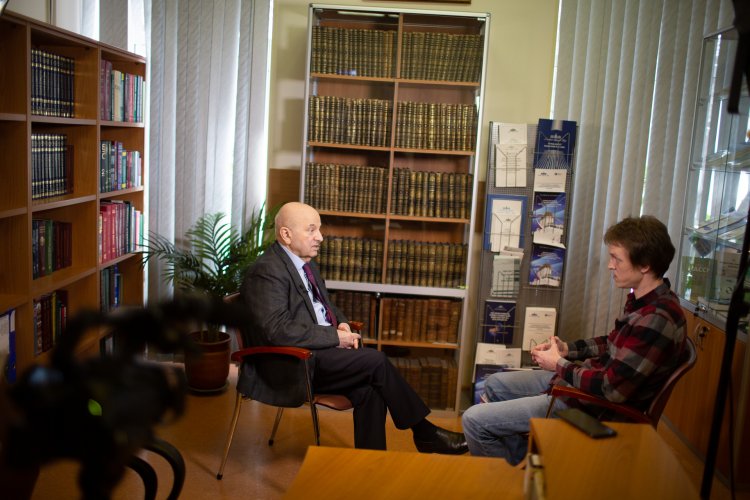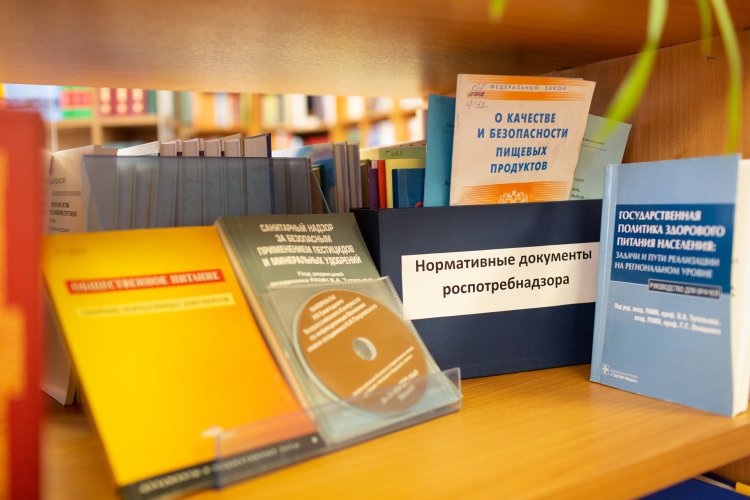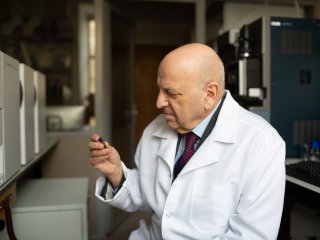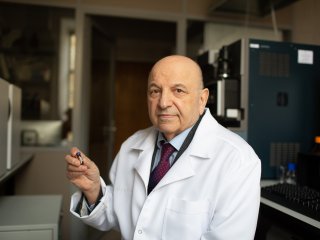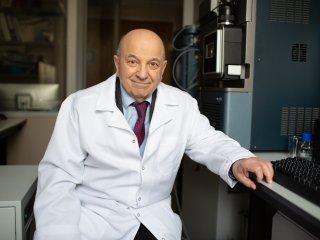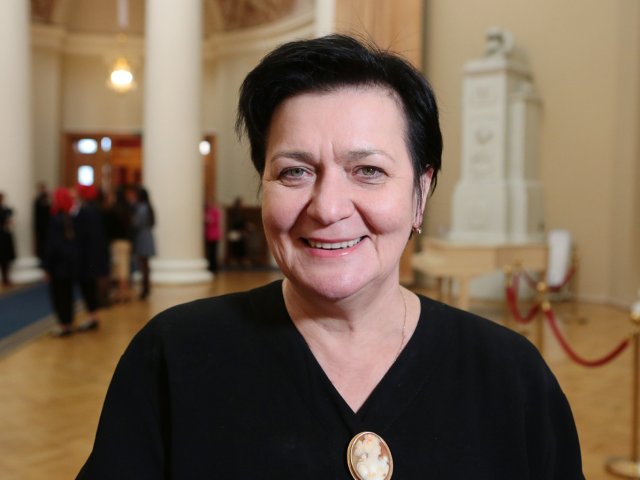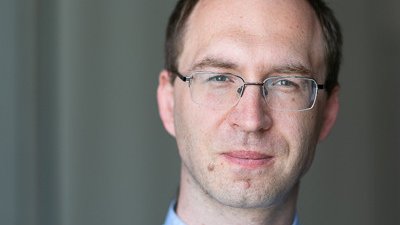Two core principles of nutrition are simple and clear: get as much energy from food as you use up and use up as many calories as you get ensuring, in the meantime, that your diet contains all the necessary nutrients. No big deal, it seems. Meanwhile, every third man and every second woman are overweight and a quarter of them suffer from class 1, class 2, and even class 3 obesity.
What prevents Russians from eating right and what is the overall level of nutrition culture in Russia? Can a diet be both healthy and affordable? How does a relatively new scientific area, anthroponutritiology, help to build customized diet plans? Victor Tutelyan, Member of RAS, Chair of the Scientific Research Institute of Nutrition, answers these questions in his interview.
Victor Tutelyan, Member of RAS, Chair of the Scientific Research Institute of Nutrition
Photo: Andrey Luft, Scientific Russia
― What goals do scientists involved in studying nutrition target? What is the purpose of their research?
― Science is in search of ways to solve two principal nutritional problems.
First, food is the source of energy and various nutrients and bioactive compounds, which we need. If their proportion is correct, the person will be healthy. Yet, we need to consider individual characteristics, too. Thus, pregnant women, breastfeeding mothers, infants, teenagers, seniors ― each group requires a special approach to nutrition.
The second global problem is food safety. Food can contain potentially toxic substances. Thus, when we build a diet plan, we need to take into account those chemical, biological, and physical factors that can harm the body.
Our main goal is to deliver necessary nutrients to every body cell in a safe and non-harmful manner.
― Should everyone have a personal diet plan?
― In a perfect world, yes, but safety is of utmost importance.
When we speak about the nutrition of a large group of people, the population of an entire country, we must consider regional, national, and family factors. Therefore, the trend towards personalized nutrition is a good one. We try to promote this trend with all available means.
Population education is paramount in this regard. On the one hand, we should reach out to all age groups, from kids to seniors, and explain what nutrients they must get with food.
On the other hand, we should ensure that food is absolutely safe for us and future generations. There are chemical contaminants that can affect genes and produce negative effects on our children’s health.
Therefore, we need to accumulate knowledge, consider individual features, look for and develop new analysis methods. Preservation of health requires a variety of scientific approaches. I don’t know a more multidisciplinary science than nutriology: we need all professionals from mathematicians to molecular biologists and politicians.
― What do you think about the level of nutrition culture in Russia?
― It is low. People focus on the wrong aspects when they choose foods. A lot of harm comes from advertising that offers foods, which we do not need. The division into prestigious and non-prestigious food is wrong, too. People should understand one can be rich and sick as well as poor and healthy.
It is only through regular cooperation between science and education system, that we can convey this message to every person.
― Does this mean attractive and expensive products are not always healthy and necessary?
― Exactly. The conflict between the quest for prestigious and unreasonable costly foods and the shortage of money to buy these foods causes psychological trauma as one is wondering, “Why can someone else afford it while I can’t?” It is important to understand that the necessary nutrients can be consumed with common inexpensive foods.
For example, we can get omega-3 fatty acids with salmon. But common herring has more omega-3 fatty acids. If a person understands it, they can adjust their diet based on what they have disregarding the advertising. But for people to use this knowledge, we should educate them from the earliest age.
A class of its own is women of childbearing age. To be ready for pregnancy even for an unintended one is their responsibility. The deficiency of a single vitamin, such as folic acid, can be fatal to the new life. And there are plenty of such nutrients. Therefore, the nutrition of every woman of childbearing age must be as adequate and balanced as possible. And we should explain that the correct diet can be built from common, cheap foods. We only should know how to choose and eat them right.
― The COVID-19 pandemic has become a challenge for doctors and scientists in the last two years. How can nutrition help to protect the body?
― When the pandemic broke out, the first thing we did was to prepare recommendations on how to protect the body with nutrition.
We need nutritious food to build immunity, the body's protection against any viral and bacterial threat. In our recommendations, we explain what this nutritious food involves.
Our body needs the right amount of native proteins, usually animal proteins: dairy proteins, fish, meat and eggs must be present in the diet in sufficient quantity because the antibody synthesis requires proteins in the first place. Secondly, we need a full range of vitamins and minerals that protect our bodies. We also need polyunsaturated fatty acids to maintain the cell membranes of the body.
There are special diets developed by fundamental science that knows what the body needs and how to provide it. But let me get back to educating people. It is the cheapest and most efficient way to keep a person and their family healthy.
― In the summer of 2021, the Scientific Research Institute of Nutrition released guidelines on nutrition, including several dozens of dishes and their recipes. What is this document?
― If nutriology or nutritional science is a science about nutrition and digestion, dietology or dietary science is almost the same, but it focuses on delivering all necessary substances to every body cell. If there is a disease that prevents the body from proper functioning, we look for alternative ways to deliver the nutrients. For example, a patient suffers from gastritis or ulcer meaning that they have problems with food absorption and digestion in the gastrointestinal tract. In the meantime, every cell must receive the required amount of nutrients, around 200 chemical compounds daily. And dietology is the science that deals with it.
In the case of gastrointestinal diseases and the poor performance of enzyme systems responsible for producing enzymes in the pancreas, we need to choose light food that is easily digested.
Since ancient times, nutritionists have been trying to circumvent obstacles and help the body digest food. Cutting-edge technologies can do a lot and nutriology is one of the leading sciences when it comes to innovations. This, for example, includes creating foods, which can provide people with as many necessary nutrients as possible.
There is this situation where we have reduced our physical activity after having received the comforts of civilization. Today, we don’t need to chop wood or carry buckets of water, as everything is within reach. On average, the physical activity of a man who doesn’t exercise much or work hard maintains at 2,200 kcal, and that of a woman ― at about 1,800 kcal. These energy demands are satisfied by a fairly modest diet. In this case, we can violate the first nutrition principle, which states that the overall amount of calories in a diet should equal energy expenditure. If you eat less, you experience weight loss and energy depletion. If you eat more, you begin to gain weight and develop grave diseases, such as atherosclerosis, arteriosclerotic heart disease, heart attack, blood stroke, and arterial hypertension. Nature offered quite a narrow avenue for us to be healthy.
― Does this mean that, although humane, nutritional science leaves us with little room for maneuver?
― There is a lot of room for maneuver but one needs the knowledge to use it and follow the first and second nutrition principles. The second principle states that even with a low-energy-density diet we must receive almost 200 chemical compounds, which the body needs.
It is not easy to build a correct diet from traditional foods, so we turned to modern technologies that allow creating foods with the required nutrient composition. Without changing the traditional food flavor, we remove unnecessary substances, such as cholesterol, and add vitamins, minerals, trace elements and adjust the fatty-acid composition of food. We work hard to ensure our food industry produces foods as delicious as those we got accustomed to but rich in nutrients.
RAS has recently established a consortium headed by its president Aleksander Sergeev. This consortium includes leading medical and agricultural institutes as well as food industry leaders.
― In other words, the production of good foods begins with sowing, right?
― One of the goals is to create a seed stock using genetic modification. Food commodities are a different area. By infiltrating a plant or animal genome, we can begin the synthesis of required substances and reduce the share of substances, which do not benefit the body.
The next stage is a technological modification, as we can also remove unnecessary substances and add necessary ones when we cook dishes from raw foods. This is especially important in child nutrition because a child’s immune and digestion systems are still being formed. Food technologists create foods, which provide for all nutritional needs of a child’s body at the maximum so that the child develops quickly and properly.
There is a need for a separate type of preventive low-calorie foods for adults. Half the population is overweight and suffers from obesity along with the accompanying bunch of diseases. It means that we have to remove sources of surplus energy from food and add vitamins, minerals, trace elements, and bioactive compounds, which boost the immune system.
The food industry has vast opportunities in this field and medicine sets the right direction for the industry as it forms a certain demand in society. Food is not a pill you take with disgust. We should create delicious foods without sacrificing any nutritional properties and people should know how to read nutrition facts labels and make a good choice.
― A short time ago, the Scientific Research Institute of Nutrition set up a new research area ― anthroponutritiology. What does it study?
― Anthropology is the science about human beings, their physical condition, physical development characteristics, and objective health indicators in the first place. Nutriology is the science about nutrition. After genetics, nutrition is the top important factor that determines physical development. Consequently, anthroponutritiology examines the interrelation and influence of these two sciences to optimize the physical and nutritional status of the population with regard to individual characteristics and the use of modern, high efficient health protection technologies.
― Is it a science about personalized nutrition? How close are we to building customized diet plans? Do we need them? Are there any methodologies that make it possible to create them?
― Personalized nutrition intended to improve health is one of the tasks of anthroponutritiology.
Personalized diets are based on group characteristics: men, women, children, elderly, and the level of their physical activity, both work-related and not. There is this paper titled “Norms of physiological needs for nutrients and energy among different population groups.” Such division is the first step to personalization. These norms for each group are used to plan nutrition for the entire population and serve as a roadmap for the government and food industry.
There are also special levels of personalized nutrition. For example, child diets, that take into account the required amount of nutrients, are developed almost every month. Different types of therapeutic diets, which are developed based on a person’s medical history, likewise relate to personalization. There is also sports nutrition: some need to run long distances and use their energy resources carefully, while others need a massive energy surge. For all this, we have special groups of foods. The list of personalized diets and approaches to nutrition is very long.
In a perfect world, one should go to the hospital, have their individual characteristics described, and, based on them, receive dietary recommendations. Such practice will become widely spread in the future and we want this procedure to be available at any hospital rather than in specialized medical institutions only.
Personalized nutrition evolves, but this requires time and an adequate level of population education. A person cannot be forced to eat right, as everyone should seek to eat right realizing that it is good for their health. Under such a scenario, people will buy proper foods for themselves and their families. But we should show the right way to choose foods in a store by relying on three factors: income, assortment, and knowledge.
This is where we, scientists and journalists, need to work together ― I know what people should do to be healthy and you know how to convey it to them, convince and motivate them.
― What predictions do nutritionists make today? Will people in Russia get fatter or thinner, healthier or sicker?
― We see two problems not only in Russia but all over the world. Firstly, there is excessive calorie intake and, consequently, obesity in the population. Secondly, there are micronutrient deficiencies, that is, the deficit of vitamins and minerals. So, there is a dilemma. You eat more, you begin to gain weight, but you also receive more micronutrients. If you limit your diet, you will receive fewer micronutrients, but the body weight will be fine.
The simplest solution consists of two parts. People should reduce their diet so that it corresponds to the energy expenditure and evaluate their weight objectively. Scales, a trouser belt, and an outside perspective will help you understand if you have excess body weight. On the other hand, you should make it a routine to consume multivitamin and mineral supplements. In America and Europe, 80% to 85% of the population consumes multivitamin and mineral supplements on a daily basis. In Russia, 25% at best. But after taking a pill during the morning coffee, a person receives the necessary micronutrients and the only thing left is to manage weight.
― Which way does the nutrition principles imbalance go? Do people try to eat right?
― They do, but this process is slow. Because there is also a third important factor, which is willpower. How to avoid overeating as a guest in someone’s house or a restaurant? Sometimes, it is very difficult to say, “Thanks, I’m full.” They put candies in front of a sweet tooth. How can the latter resist the temptation? Willpower based on the understanding of core nutrition principles is the only way out.
This is a complex problem. Food culture must include sports, increased physical activity, a balanced diet, and enriched foods.
― Does Russia have many scientists and doctors specializing in nutrition?
― There is a need for such professionals. We need well-educated people. Many turn to nutriology hoping for a chance to make money. I see this trend and I am really concerned that there are people who do not have due qualifications and can harm others.
So, we need to rely on our own knowledge. You do not have to count every calorie, but if you know you have overeaten today, go for a run tomorrow or simply go for a walk, use up the consumed energy. There are no miracles. The miracles of the right nutrition are clear principles, which must be followed: receive all nutrients you need from the amount of food that corresponds to your energy expenditure. Seems very simple. But also difficult.
The interview was conducted with the support of the Ministry of Science and Higher Education of the Russian Federation and the Russian Academy of Sciences
